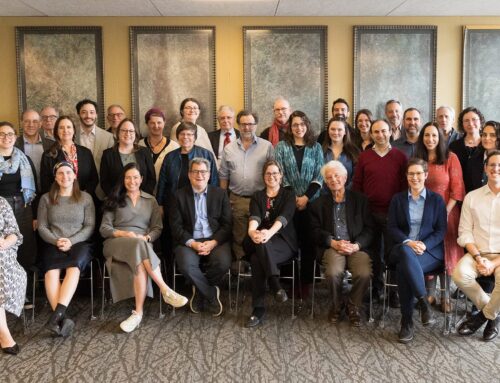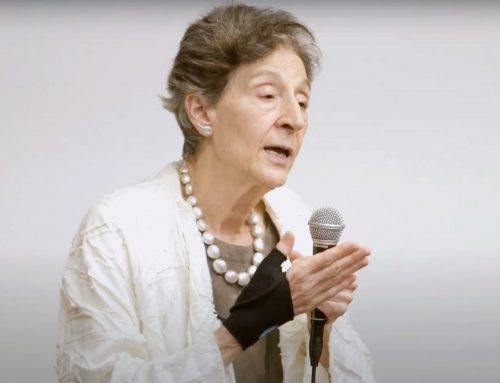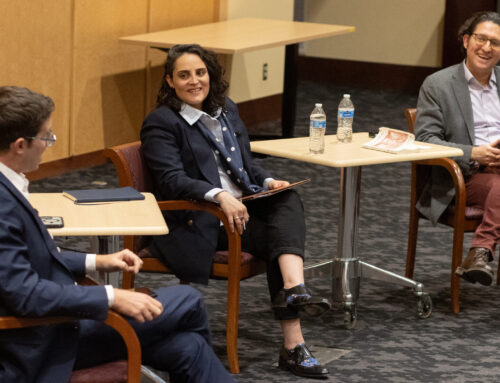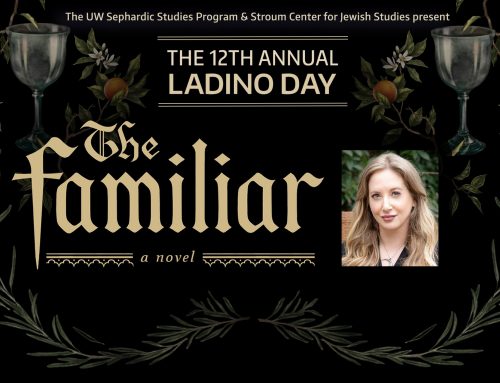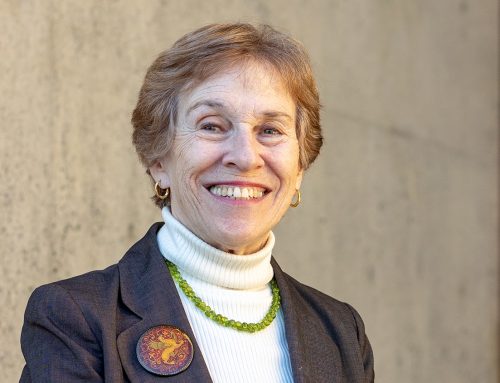
At the inaugural JewDub Talks in 2012, Stroum Jewish Studies at the University of Washington proved that, indeed, a pocket-sized lecture can be a window onto a new world. This special evening program was inspired by the phenomenon of TED Talks, a global movement centered around “ideas worth spreading” through short talks given by experts and practitioners in a wide range of fields. In our Seattle spin on this popular format, we showcased four UW faculty members giving short lectures on big ideas in Jewish history and culture.
The TED-inspired format provided students and community members up-close access to several of our dynamic teachers. JewDub Talks allowed our faculty to explore topics that are personally and intellectually compelling for them, but maybe never made it onto a course syllabus. The result? According to this review in the JTNews, the event was thought-provoking for all involved.
Scholarship that is directly engaged with the community is one of the Stroum Jewish Studies Program’s hallmarks. We hope that you will browse through these videos, share them with others, and use them to spark conversations in your own communities.
“So Why Yiddish?”
Barbara Henry
Barbara Henry examines the connection between personal identity and academic pursuit of an endangered language. She gives a passionate explanation for her work with Yiddish, a language that “chose her,” and concludes with a powerful reading and interpretation of a Yiddish poem.
Barbara Henry is Associate Professor of Slavic Languages and Literatures at the University of Washington. She is the author of Rewriting Russia: Jacob Gordin’s Yiddish Drama (2011) and co-editor, with Joel Berkowitz, of Inventing the Modern Yiddish Stage: Essays in Drama, Performance, and Show Business (2012). Read a JewDub story about Prof. Henry’s work.
“Why Break a Glass at a Wedding?”
Shalom Sabar
Shalom Sabar uncovers the origin of one of the most familiar Jewish customs: breaking the glass at a wedding. Using artistic, textual, and anthropological evidence, he ultimately suggests a surprising source for the broken glass ritual.
Shalom Sabar is Professor of History of Art and Jewish Folklore at the Hebrew University of Jerusalem. He is the author of many landmark studies of Jewish art including Jerusalem – Stone and Spirit: 3000 Years of History and Art (with Dan Bahat; 1998); Ketubbah: The Art of the Jewish Marriage Contract (New York, 2001); and The Life Cycle of the Jews in the Lands of Islam] (Jerusalem, 2006). Professor Sabar is the Schusterman Visiting Israeli Professor at the University of Washington for 2012-2013, a residency supported by the American-Israeli Cooperative Enterprise (AICE) and the Samis Foundation.
“In Search of Uncle Salomon”
Devin Naar
Devin Naar explains the twist of fate that led him to piece together his own family’s experience in the Holocaust. His journey led him to the serious study of Ladino (Judaeo-Spanish) and a new perspective on the stories that Jewish historians need to tell.
Devin E. Naar is the Marsha & Jay Glazer Assistant Professor in Jewish Studies and Assistant Professor of History at the University of Washington. An expert in Sephardic history and culture, he heads the Sephardic Studies Initiative at UW. His forthcoming book will explore Jewish Salonica, known as “the Jerusalem of the Balkans,” at the turn of the twentieth century. Read a recent blog post in Professor Naar’s ongoing series, Discovering Sephardic Treasures.
“The Myth of Tradition”
Sarah Stroup
Archaeology may say one thing, but our narratives say another. Sarah Stroup surveys Judah Maccabee, Alexander the Great, and the ancient Greek-Jewish dramatist Ezekiel for lessons in “cultural adaptability,” a trait which has helped the Jews survive and thrive over time.
Sarah Culpepper Stroup is an Associate Professor in the Department of Classics at the University of Washington in Seattle, and serves as faculty in the programs of Jewish Studies, Comparative Religion, and Theory and Criticism. Her recent publications include Catullus, Cicero, and a Society of Patrons: The Generation of the Text (2010). Read Professor Stroup’s recent blog post exploring flood myths; and read a profile of Professor Stroup and her archaeological excavations in Dor, Israel.

